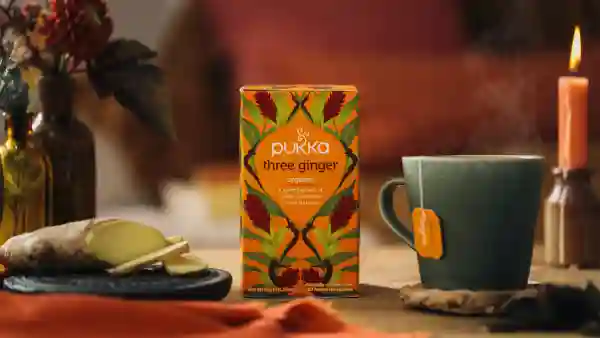

Winter herbs to keep you warm when it’s cold outside
There is nothing quite like putting on a favourite jumper, enjoying a hot bath or curling up by a roaring fire to keep warm and cosy in the depths of winter. Sipping a steaming hot cup of tea can also bring your body an instant sensation of warmth. But did you know there are certain winter herbs that can stoke the body’s internal fire to warm us from the inside? Ayurveda, India’s traditional science of wellbeing, calls this inner fire ‘agni’ and uses herbs such as ginger, black pepper, cinnamon and cloves to keep it roaring.
Traditional ‘hot’ herbal remedies often contain essential oils which generate warmth when taken. You can think of it like turning up the heating dial on your central heating. The following seasonal herbs and spices all have a long history of traditional use for countering the impact of cold and reducing symptoms made worse in the cold. For this reason, they were greatly valued and were once some of the most valuable natural commodities in human history. For example, ginger root was carried long distances from Asia to Europe and was once worth more than its weight in gold!
Ginger
Ginger is a fantastically warming plant, whose spicy root supports our ability to digest food, as well as giving our circulation a boost. This helps to warm up the inner body as well as extremities such as hands and feet. You can add ginger to a range of savoury and sweet dishes, have a hot cup of ginger tea or even a ginger bath to keep you warm all night without that electric blanket. To use ginger in your bath, boil about a litre of water with 250g of chopped fresh ginger root for about 20 minutes to make a strong ‘ginger tea’. Strain and pour into your bath. Alternatively, use your ‘ginger tea’ for a foot bath — a surprisingly effective way to warm up the entire body. So, make sure you have fresh ginger root in your fridge and dried ginger on your spice rack this winter, especially if you are prone to feeling the cold. We use ginger in a range of teas such as our Winter Warmer as well as Three Ginger.
Cinnamon
Cinnamon was also a valuable plant remedy in human history. This popular winter spice is much favoured for its warming digestive effects and delicious, sweet taste. Traditionally it is used to support digestion and invigorate circulation, as well as any conditions where you feel the cold. The bark of the cinnamon tree is used to make the spice. As a bark protects a tree, cinnamon protects the digestive system. It is full of sweet and stimulating essential oils which invigorate and warm the body. It can be added to pancakes, porridge, toast, bakes and also savoury dishes such as tagines and stews. Cinnamon combines especially well with ginger. A fresh ginger and cinnamon tea provides a quick way to bring warmth to the body, much the same way as we would use a hot water bottle to warm from the outside. We have a variety of cinnamon teas including comforting blends like Wild Apple and Cinnamon and Original Chai.
Black pepper
Black pepper is known as the king of the spices and was once known as ‘black gold’. It was valued for not only flavouring foods, but also acting as a preservative and adding heat to a dish. It is known to increase blood flow and your body’s ability to stay warm thanks to its bioactive compounds, with piperine being the most important. Piperine also has a positive effect on nutrient bioavailability so when you add pepper to your meal, you increase the amount of nutrients absorbed into your bloodstream. This makes it helpful with poor appetite and absorption. However, black pepper is a very hot herb that should be used with caution and in moderation! Whenever possible, grind your own pepper from peppercorns when preparing a meal for maximum effect. We use black pepper in warming blends such as Revitalise and Winter Warmer.
Cloves
Cloves have been used in Southeast Asia for thousands of years and their powerful health benefits are still regarded as a panacea for countless ills in both Ayurveda and Traditional Chinese Medicine. Cloves are warm and invigorating to the mind and body and beneficial for people with cold extremities. They can be used widely in both food and drink recipes to help dispel the chill, which is why you'll often find this warming spice in many seasonal winter recipes. It is recommended to purchase whole cloves instead of clover powder for the best action. The scent of cloves is strongly associated with the festive season and they are often included in recipes to mull apple juice, cider or wine. Why not try this mulling recipe to feel festive and keep warm this winter?
Turmeric
Turmeric is known as ‘the golden goddess’ in India as it is such a valued spice to help rejuvenate body and mind. Indeed, it is one of the most well-known, widely researched and commonly used spices in the world. It has a gently warming action that is perfect for subtly increasing your core temperature. Turmeric’s warming nature also enables it to have a mobilizing and cleansing energy, which naturally enkindles the digestive fire. No curry or dhal is complete without adding this golden spice, but it also adds both colour, flavour and benefits to light-coloured vegetables, porridge and pancakes. Additionally, you can make a mug of warming ‘golden milk’ with the addition of cloves, ginger and cinnamon. If you don’t have these warm spices to hand, you can heat up your milk of choice in a pan with a teabag or two of our turmeric teas like Wild apple and cinnamon or Vanilla Chai.
Advice on buying herbs to stay warm this winter
It’s important to remember that these warming winter herbs and spices are derived from plants that might be exposed to chemicals as they are grown. Buying organic is the only way to ensure that what you're consuming has the least possible pesticides, no chemicals or genetic modification. Organic farms have been shown to have 50% more biodiversity than non-organic farms, so eating organically is good for wildlife too. Additionally, non-organic herbs and spices often contain fillers, preservatives and artificial flavourings. Organic foods have also been shown to contain up to 60% more antioxidants than non-organic food.
Try to use herbs within their use-by date and have a thorough spring clean of your kitchen spice rack every year to ensure you have fresh spices full of prana (life force).
So, why not supplement your favourite jumper with these five hero herbs to keep you warm from the inside out this winter and get extra health benefits while you are at it? To set yourself up for the day, make your first drink something warming and invigorating. Our first seasonal edition tea, Winter Warmer, is a perfect blend of festive herbs to feel warm, joyful and comforted.
For more seasonal tips see our Winter wellbeing guide , which includes even more advice for harnessing the power of herbs in winter.
